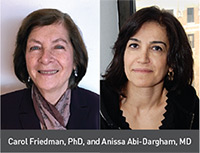News in Brief
 Two P&S faculty members were elected last fall to the National Academy of Medicine, formerly the Institute of Medicine: Carol Friedman, PhD, professor of biomedical informatics, and Anissa Abi-Dargham, MD, professor emeritus of psychiatry. Dr. Friedman is an expert in natural language processing for biomedical applications. Dr. Abi-Dargham, who is now professor of psychiatry at Stony Brook University, uses imaging studies to uncover the pathophysiology of schizophrenia, schizophrenia-related disorders, and addiction to reveal chemical changes that occur that may potentially serve as risk markers for the disease and improve interventions.
Two P&S faculty members were elected last fall to the National Academy of Medicine, formerly the Institute of Medicine: Carol Friedman, PhD, professor of biomedical informatics, and Anissa Abi-Dargham, MD, professor emeritus of psychiatry. Dr. Friedman is an expert in natural language processing for biomedical applications. Dr. Abi-Dargham, who is now professor of psychiatry at Stony Brook University, uses imaging studies to uncover the pathophysiology of schizophrenia, schizophrenia-related disorders, and addiction to reveal chemical changes that occur that may potentially serve as risk markers for the disease and improve interventions.
The American Association for the Advancement of Science named three P&S faculty members as 2016 AAAS Fellows: Max E. Gottesman, MD, PhD, the Charles H. Revson Professor of Biochemistry & Molecular Biophysics and of Microbiology & Immunology, who was selected for his fundamental insights leading to the understanding of transcription termination in E. coli and how termination affects other cellular processes; Wei Gu, PhD, the Abraham and Mildred Goldstein Professor of Pathology & Cell Biology (in the Institute for Cancer Genetics) for his contributions to the field of protein modifications in modulating stress responses, particularly for acetylation/deacetylation and ubiquitination/deubiquitination in p53-mediated tumor suppression; and Paul Sajda, PhD, professor of biomedical engineering and of radiology, for contributions to the understanding of neural correlates of vision, human perceptual decision-making, and cortically coupled computer vision.
Two P&S faculty members will lead a new community wellness center located in the Jerome L. Greene Science Center on Columbia’s new Manhattanville campus. Neurologist Olajide Williams, MD, and psychiatrist Sidney Hankerson, MD, are known for their pioneering approaches to improving public health in Harlem and Washington Heights. The center will operate with support from Columbia’s Mortimer B. Zuckerman Mind Brain Behavior Institute.
The center will house the Community Health Worker Stroke Prevention program, designed to raise awareness about one of the leading causes of death and disability in the United States. The free program includes six-week training sessions held throughout the year that will give local residents the tools they need to become community health workers. Volunteers will learn about cardiovascular health issues, with a special emphasis on stroke and related risk factors. The program, modeled on the Centers for Disease Control and Prevention’s training curriculum for community health workers, is led by Dr. Williams, associate professor of neurology, chief of staff of neurology, founder of Hip Hop Public Health, and co-director of the Center for Stroke Disparities Solutions in New York. The center also will be a home base for Mental Health First Aid, a program dedicated to improving access to quality mental health services in Upper Manhattan. The program, founded by Dr. Hankerson, assistant professor of clinical psychiatry, works with local faith communities to train leaders to identify and respond to signs of depression and other mental illnesses, as well as substance use disorders like alcoholism and drug addiction. In addition to stroke and mental health awareness programs, the center will provide free blood pressure readings and cholesterol tests on weekdays and select weekends to all who walk in.
Three P&S faculty members received grants last fall through Columbia’s faculty diversity initiative, the Provost’s Grants Program for Junior Faculty Who Contribute to the Diversity Goals of the University: Richard Francis, MD, PhD, assistant professor of pathology & cell biology, for “Localization of Stored Platelets to Sites of Active Bleeding Following Transfusion”; Monica Goldklang, MD, assistant professor of medicine (in anesthesiology), for “In Vivo Imaging of Lung Apoptosis in Alpha-1 Antitrypsin Deficiency”; and Esi Lamousé-Smith, MD, PhD, assistant professor of pediatrics, for “Infant Gastrointestinal Tract Microbiome Dysbiosis and its Impact on CD8+T Cell Gene Transcription Regulation.”
- Log in to post comments

